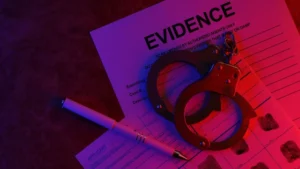

What is Reckless Driving?
Imagine speeding down a highway, weaving through traffic with no regard for safety, or running a red light at full speed. These actions don’t just violate traffic laws—they can result in a reckless driving charge, a serious offense that carries hefty penalties and long-term consequences.
Reckless driving is generally defined as operating a vehicle with a willful or wanton disregard for the safety of people or property. Unlike minor traffic infractions, reckless driving is often classified as a misdemeanor or felony, depending on the circumstances.
Understanding how reckless driving is prosecuted, what legal defenses exist, and how sentencing is determined is crucial for anyone facing such a charge. This article will provide an in-depth look at reckless driving laws, penalties, real-life examples, and defense strategies.
Reckless Endangerment: How Reckless Driving Puts Lives at Risk
A reckless driving charge is often linked to reckless endangerment, which refers to actions that put others in imminent danger of harm. Many states treat reckless endangerment as a separate criminal charge, adding further penalties on top of the reckless driving offense.
Examples of Reckless Endangerment in Driving
- Excessive speeding: Driving 30+ mph over the limit in a school zone or residential area.
- Street racing: Competing with another driver in high-speed, illegal races.
- Ignoring stop signs and red lights: Disregarding essential traffic control devices in a manner that creates immediate danger.
- Evading police: Fleeing from law enforcement by driving dangerously through traffic.
In one well-documented case, a driver in Florida was arrested after speeding through a crowded pedestrian area, nearly striking several people. The reckless driving charge was elevated to reckless endangerment due to the high probability of injury.
Legal Consequences of Reckless Endangerment
If convicted of reckless endangerment as part of a reckless driving case, a person may face:
- Jail time (from a few days to several years, depending on severity).
- License suspension (typically from 30 days to a year).
- Significant fines (ranging from hundreds to thousands of dollars).
- Increased insurance rates or policy cancellations.
Traffic Safety and the Impact of Reckless Driving
Reckless driving has severe consequences for both drivers and the public. According to the National Highway Traffic Safety Administration (NHTSA), reckless driving behaviors like speeding and aggressive driving contribute to nearly 30% of all fatal crashes in the United States.
How Reckless Driving Affects Road Safety
- Pedestrian deaths: Reckless drivers are responsible for thousands of pedestrian fatalities each year.
- Traffic congestion: Dangerous driving leads to accidents that slow down traffic and increase commute times.
- Economic impact: Crashes linked to reckless driving result in billions of dollars in damages, including medical costs and lost productivity.
One study by the Insurance Institute for Highway Safety (IIHS) found that states with stricter penalties for reckless driving see a 10-15% decrease in repeat offenses. This highlights how legal consequences can play a role in improving traffic safety.
Sentencing Factors in Reckless Driving Cases
Not all reckless driving charges result in the same penalties. Courts consider several factors when determining a sentence, including:
- Speed and conditions: Driving 90 mph on a deserted highway may be viewed differently than 90 mph in a school zone.
- Presence of injuries: If reckless driving results in a crash that injures or kills someone, felony charges may apply.
- Driver’s record: First-time offenders may receive lighter sentences, while repeat offenders face harsher penalties.
- Intent and behavior: Aggressive actions like road rage or DUI can increase sentencing severity.
Judges often have discretion in reckless driving cases. Some offenders may be eligible for probation, community service, or defensive driving courses in place of jail time.
Case Study: How One Driver Fought a Reckless Driving Charge
Background
Sarah, a 27-year-old nurse, was pulled over after allegedly driving 85 mph in a 50 mph zone on a wet road. She was charged with reckless driving and faced up to 60 days in jail, a $500 fine, and a six-month license suspension.
Defense Strategy
Sarah’s lawyer built a defense based on the following:
- Weather Conditions & Road Conditions: The lawyer argued that her tires lost traction due to sudden rainfall, causing an unintentional increase in speed.
- Radar Calibration: The defense requested the police radar’s calibration records. It was discovered that the device hadn’t been tested in weeks, raising concerns about accuracy.
- Character & Clean Record: Sarah had no prior violations and was a responsible professional. Her attorney presented character references to support a plea for reduced penalties.
Outcome
The prosecutor agreed to reduce the charge to a non-criminal speeding infraction, resulting in a $250 fine and a mandatory traffic safety course. Sarah avoided jail time and a permanent criminal record.
Conclusion
Understanding reckless driving charges can make the difference between a conviction and a reduced penalty. If you or someone you know is facing this charge, consulting with a criminal defense attorney can help navigate the legal system and achieve the best possible outcome.
Frequently Asked Questions (FAQs)
- Is reckless driving a misdemeanor or a felony? Reckless driving is usually classified as a misdemeanor, but it can be charged as a felony if it results in serious injury, death, or repeated offenses.
- How can I beat a reckless driving charge? Common defenses include challenging radar accuracy, proving a lack of intent, arguing emergency circumstances, or negotiating a plea deal.
- Will reckless driving show up on a background check? Yes, a conviction can appear on criminal background checks, potentially affecting employment and insurance rates.
- Can a reckless driving charge be expunged? Some states allow expungement after a certain period, but eligibility depends on state laws and prior convictions.
- How much does a reckless driving ticket cost? Fines vary widely, ranging from $200 to $2,500, depending on the state and circumstances.



